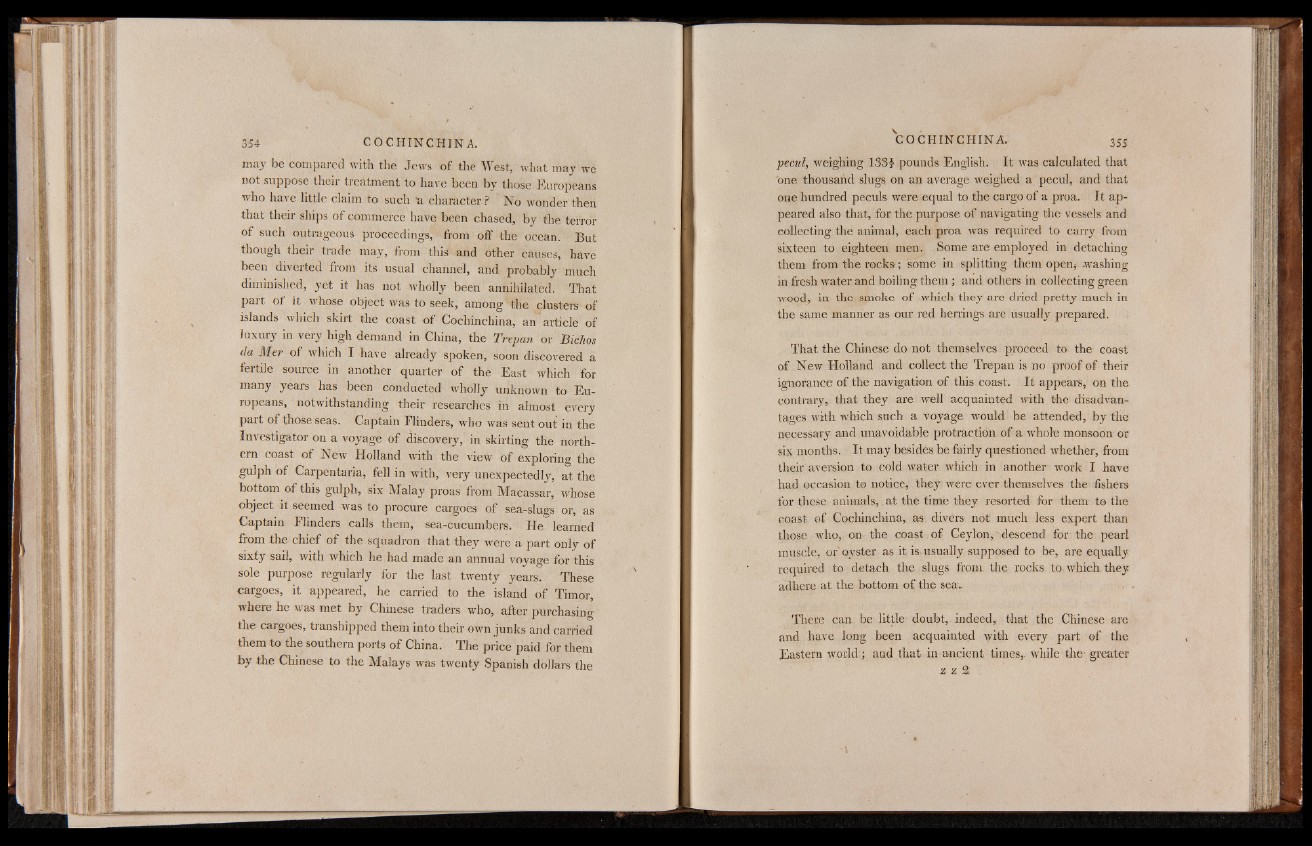
may be compared with* the Jews of the West, what may we
not suppose their treatment to have been by those Europeans
who have little claim to such ‘a character ? No wonder then
that their ships of commerce have been chased, by the terror
of such outrageous proceedings, from off the ocean. But
though their trade may, from this and other causes, have
been diverted from its usual channel, and probably much
diminished, yet it has not wholly been annihilated. That
part of it whose object was to seek, among the clusters of
islands which skirt the coast of Cochinchina, an article of
luxury in very high demand in China, the Trepan or Bichos
da Mer of which' I have already spoken, soon discovered a
fertile source in another quarter of the East which for
many years has been conducted wholly unknown to Europeans,
notwithstanding their researches in almost every
part of those seas. Captain Flinders, who was sent out in the
Investigator on a voyage of discovery, in skirting the northern
coast of New Holland with the view of exploring the
gulph of Carpentaria, fell in with, very unexpectedly, at the
bottom of this gulph, six Malay proas from Macassar, whose
object it seemed was to procure cargoes of sea-slugs or, as
Captain Flinders calls them, sea-cucumbers. He learned
from the chief of the squadron that they were a part only of
sixty sail, with which he had made an annual voyage for this
sole purpose regularly for the la st. twenty years. These
cargoes, it appeared, he earned to the island of Timor,
where he was met by Chinese traders who, after purchasing
the cargoes, transhipped them into their own junks and carried
them to the southern ports of China. The price paid for them
by the Chinese to the Malays was twenty Spanish dollars the
pecul, weighing 135f pounds English. It was calculated that
'one thousand slugs on an average weighed a pecul, and that
one hundred peculs were equal to the cargo of a proa. It appeared
also that, for the purpose of navigating the vessels and
collecting the animal, each proa was required to carry from
sixteen to eighteen men. Some are employed in detaching
them from the rocks; some in splitting them open, -washing
in fresh water and boiling them ; and others O in collectinog ogreen
wood, in the smoke of which they are dried pretty much in
the same manner as our red herrings are usually prepared.
That the Chinese do not themselves proceed to the coast
of New Holland and collect the Trepan is no proof of their
ignorance of the navigation of this coast. It appears, on the
contrary, that they are well acquainted with the disadvantages
with which such a voyage would be attended, by the
necessary and unavoidable protraction of a whole monsoon or
six months. It may besides be fairly questioned whether, from
their aversion to cold water which in another work I have
had occasion to notice, they were ever themselves the fishers
for these animals, ,at the time they resorted for them to the
coast of Cochinchina, as divers not much less expert than
those who, on- the coast of Ceylon,'descend for the pearl
muscle, or- oyster as it is- usually supposed to be, are equally
required to detach the slugs from, the rocks to which, they
adhere at the bottom of the sea.
There can be little' doubt,, indeed, that the Chinese are
and have long been acquainted with every part of the
Eastern world; and that in ancient times,, while the greater
z z %